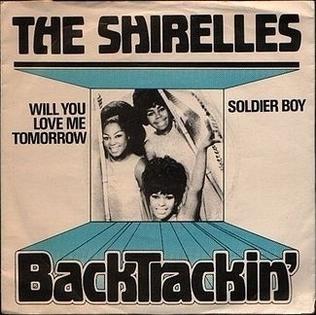
Will You Love Me Tomorrow
"Will You Love Me Tomorrow", sometimes known as "Will You Still Love Me Tomorrow",[3] is a song with words by Gerry Goffin and music composed by Carole King. It was recorded in 1960 by the Shirelles at Bell Sound Studios in New York City, and hit number one on the Billboard Hot 100 chart. The song was the first by an African-American all-girl group to reach number one in the United States.[4] It has since been recorded by many other artists, including a version by co-writer King released on her 1971 album Tapestry.
Not to be confused with Will You Still Love Me?."Will You Love Me Tomorrow"
The Shirelles' version[edit]
Background[edit]
In 1960, the American girl group the Shirelles released the first version of the song as Scepter single 1211, with "Boys" on the B-side. The single's first pressing was labeled simply "Tomorrow", then lengthened later. When first presented with the song, lead singer Shirley Owens (later known as Shirley Alston-Reeves) did not want to record it, because she thought it was "too country". She relented after a string arrangement was added. However, Owens recalled on Jim Parsons's syndicated classic radio program, Shake Rattle Showtime, that some radio stations had banned the record because they had felt the lyrics were too sexually charged. The song is in AABA form.[5]
Reception[edit]
In addition to reaching No. 1 in the United States, the song reached No. 2 on the R&B chart and No. 4 in the UK.[6] It reached No. 3 in New Zealand.[7] This version of the song, with session musicians Paul Griffin on piano and Gary Chester on drums, was ranked at No. 126 among Rolling Stone's list of The 500 Greatest Songs of All Time. Billboard named the song No. 3 on its list of 100 Greatest Girl Group Songs of All Time.[8]
Carole King version[edit]
Background[edit]
In 1971, Carole King, who composed the music of the song, recorded a version of "Will You Love Me Tomorrow" for her second studio album Tapestry, with Joni Mitchell and James Taylor performing background vocals on separate audio channels.[17] King's version of the song was taken at a considerably slower tempo. David Hepworth analyzed it as "less like the pleas for gentleness on the part of a trembling virgin and more like a mature woman requiring parity in a relationship."[17] It gained considerable album-oriented rock airplay due to the large-scale commercial success of the album.
The song became a feature of King's live shows. Taylor recreated his part during their joint arena-based Troubadour Reunion Tour of 2010.
In the 2013 Broadway musical Beautiful: The Carole King Musical, the song is featured in part four times: once during its writing, once during King recording a demo of it, then with the Shirelles performing it, and then King singing and playing it later during an especially bad time in her marriage with Goffin. No other song is featured as frequently in the musical.